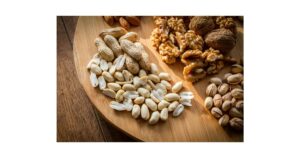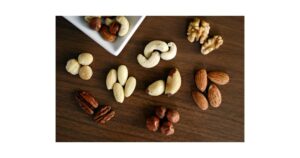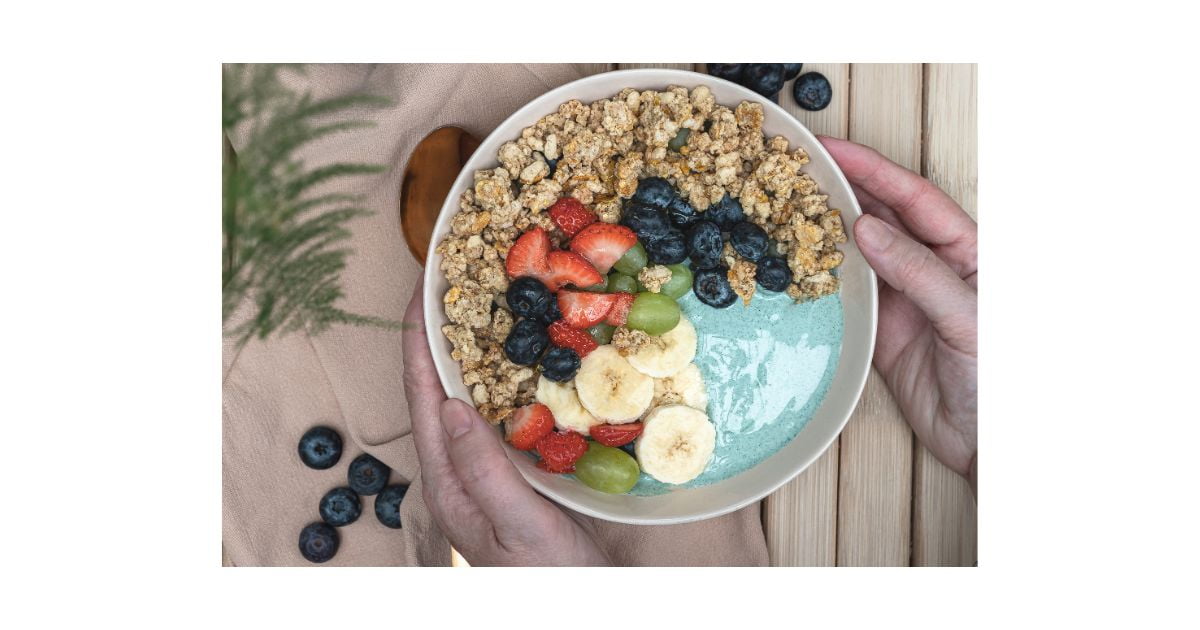Introduction: In the realm of nutrition, few things rival the wholesome goodness of dry fruits. Bursting with essential nutrients, these concentrated packages of flavor and health have been cherished across cultures for centuries. From snacking to cooking, dry fruits have established themselves as versatile ingredients that not only tantalize our taste buds but also nourish our bodies. Let’s delve deeper into the enriching world of dry fruits and uncover the myriad benefits they offer.



A Treasure Trove of Nutrients: Dry fruits are nature’s treasure trove, packed with an array of essential nutrients. Whether it’s almonds, walnuts, pistachios, raisins, or apricots, each variety brings its unique nutritional profile to the table. These miniature powerhouses are rich in vitamins, minerals, healthy fats, and dietary fiber, making them an invaluable addition to any diet.
For instance, almonds boast an impressive content of vitamin E, an antioxidant known for its skin-rejuvenating properties and its role in boosting immunity. Walnuts are renowned for their omega-3 fatty acids, which are vital for heart health and cognitive function. Similarly, raisins, packed with iron and potassium, offer a natural energy boost while supporting bone health and regulating blood pressure.
A Healthful Snacking Alternative: In a world inundated with sugary snacks and processed foods, dry fruits stand out as a healthful alternative. Their natural sweetness satisfies cravings without the need for added sugars, making them an ideal choice for those looking to maintain a balanced diet or manage weight. Additionally, the combination of fiber and protein in dry fruits helps promote satiety, keeping hunger pangs at bay between meals.
Moreover, dry fruits are convenient and portable, making them perfect for on-the-go snacking. Whether you’re at work, school, or traveling, a handful of almonds or a pack of dried apricots can provide a quick and nutritious pick-me-up, keeping you fueled and focused throughout the day.
Culinary Versatility: Beyond snacking, dry fruits lend themselves beautifully to a myriad of culinary creations. From salads and granolas to baked goods and savory dishes, their rich, nutty flavors add depth and complexity to a wide range of recipes. Think of the subtle sweetness of raisins in a savory pilaf or the crunch of chopped almonds atop a creamy dessert—the possibilities are endless.
Furthermore, dry fruits can be incorporated into homemade trail mixes, energy bars, and smoothies, allowing you to customize your snacks to suit your taste preferences and dietary needs. Their versatility extends to both sweet and savory applications, making them a staple ingredient in cuisines around the globe.
A Source of Longevity: The health benefits of incorporating dry fruits into your diet extend far beyond mere sustenance. Research suggests that regular consumption of dry fruits may contribute to a reduced risk of chronic diseases such as cardiovascular ailments, diabetes, and certain types of cancer. Their abundance of antioxidants helps combat oxidative stress and inflammation, two underlying factors implicated in the development of various health conditions.
Moreover, the fiber content in dry fruits supports digestive health by promoting regularity and preventing constipation. By nourishing your body from within, these nutrient-dense gems pave the way for a longer, healthier life, allowing you to savor each moment to the fullest.
In Conclusion: In a world where processed foods reign supreme, the timeless appeal of dry fruits endures as a beacon of health and vitality. From their nutritional richness to their culinary versatility, dry fruits offer a myriad of benefits that transcend mere sustenance. Whether enjoyed as a wholesome snack or incorporated into your favorite recipes, these natural wonders have the power to nourish both body and soul, making them an indispensable part of a balanced lifestyle. So, the next time you reach for a snack, consider indulging in the wholesome goodness of dry fruits—you’ll be glad you did.
Table of Contents
ToggleExploring the Exquisite World of Dry Fruits: A Journey Through Nature’s Treasures
In the realm of nutrition and culinary delights, few things rival the richness and elegance of dry fruits. These tiny marvels of nature pack a powerful punch of flavor, nutrients, and versatility, making them an indispensable part of cuisines and lifestyles across the globe. From the lush valleys of California to the sun-kissed orchards of Turkey, dry fruits come in a dazzling array of varieties, each with its unique taste, texture, and health benefits. Let’s embark on a delightful journey through the fascinating world of dry fruits, exploring some amazing varieties that captivate both the palate and the senses.
1. Almonds: The King of Nuts
Almonds, with their delicate crunch and creamy texture, reign supreme in the realm of dry fruits. Packed with heart-healthy fats, protein, fiber, and a plethora of vitamins and minerals, almonds are a nutritional powerhouse. Whether enjoyed raw, roasted, or as a creamy almond butter, these versatile nuts add a delightful touch to both sweet and savory dishes, making them a favorite among health enthusiasts and culinary aficionados alike.
2. Pistachios: The Jewel of the Orient
Originating from the ancient lands of Persia, pistachios are revered for their vibrant green hue, buttery texture, and subtly sweet flavor. Rich in antioxidants, protein, and essential nutrients like potassium and vitamin B6, pistachios offer a deliciously wholesome snacking experience. Whether sprinkled over salads, folded into baked goods, or enjoyed straight from the shell, pistachios add a touch of elegance to any culinary creation.
3. Dates: Nature’s Candy
Sweet, luscious, and irresistibly chewy, dates are nature’s answer to caramel candy. Bursting with natural sugars, fiber, and an array of vitamins and minerals, dates offer a guilt-free indulgence packed with nutritional goodness. Whether stuffed with creamy almond butter, blended into smoothies, or incorporated into decadent desserts, dates lend their rich, caramel-like flavor to a myriad of culinary delights, making them a beloved staple in both sweet and savory dishes.
4. Walnuts: The Brain Booster
Shaped like miniature brains, walnuts are renowned for their brain-boosting properties and distinctively earthy flavor. Packed with omega-3 fatty acids, antioxidants, and anti-inflammatory compounds, walnuts are hailed for their role in supporting heart health, cognitive function, and overall well-being. Whether crushed into a crunchy topping, folded into baked goods, or simply enjoyed as a wholesome snack, walnuts add a delightful crunch and nutty richness to any dish they grace.
5. Dried Cranberries: Tart and Tangy Delight
Bright, tart, and irresistibly tangy, dried cranberries add a burst of flavor and color to a variety of dishes. Rich in antioxidants, vitamins, and fiber, dried cranberries offer a refreshing contrast to the richness of nuts and the sweetness of dried fruits. Whether tossed into salads, baked into muffins, or enjoyed as a standalone snack, dried cranberries infuse dishes with a delightful zing that awakens the taste buds and invigorates the senses.
6. Apricots: Nature’s Sweethearts
With their delicate sweetness and velvety texture, dried apricots capture the essence of sun-kissed orchards in every bite. Packed with vitamins A and C, fiber, and antioxidants, dried apricots offer a nourishing treat that satisfies the sweet tooth while supporting overall health and well-being. Whether enjoyed on their own, paired with cheese, or incorporated into savory dishes, dried apricots add a touch of sunshine to any culinary creation, making them a beloved favorite among food enthusiasts of all ages.
In conclusion, the world of dry fruits is a treasure trove of flavors, textures, and nutritional benefits waiting to be explored. From the buttery richness of almonds to the tangy sweetness of dried cranberries, each variety offers a unique sensory experience that celebrates the bountiful gifts of nature. Whether enjoyed as a wholesome snack, a decadent dessert, or a savory addition to culinary creations.
he Sweet and Nutritious Delight: Exploring the Anjeer Dry Fruit
In the realm of dry fruits, few evoke the senses and satiate the palate quite like the anjeer, or fig. Renowned for its delectable taste and myriad health benefits, the anjeer holds a special place in culinary traditions and nutritional practices worldwide. From its rich history to its modern-day applications in both gastronomy and wellness, the anjeer dry fruit continues to captivate and nourish.
A Glimpse into History
The story of the anjeer stretches back thousands of years, with its origins tracing to the Mediterranean region and parts of Western Asia. Revered in ancient cultures such as Greek, Roman, and Egyptian civilizations, figs were celebrated for their sweetness and purported medicinal properties. Over time, the cultivation of figs spread across continents, finding homes in diverse climates and terrains.
In various historical texts and scriptures, figs often symbolize abundance, fertility, and even enlightenment. Their mention in religious texts like the Bible and the Quran underscores their significance in cultural and spiritual contexts. From ancient mythology to modern folklore, figs have maintained a mystique that transcends time and borders.
Nutritional Bounty
Beyond their delectable flavor, anjeer dry fruits boast a treasure trove of nutrients essential for overall well-being. These include:
- Dietary Fiber: Anjeer is rich in dietary fiber, promoting digestive health and aiding in weight management by inducing a feeling of fullness.
- Vitamins and Minerals: Figs contain essential vitamins and minerals like potassium, calcium, magnesium, vitamin K, and B vitamins, contributing to bone health, muscle function, and overall vitality.
- Antioxidants: Loaded with antioxidants like polyphenols and flavonoids, anjeer helps combat oxidative stress, reducing the risk of chronic diseases and promoting cellular health.
- Natural Sugars: Despite their sweetness, figs have a relatively low glycemic index, making them a suitable option for individuals managing blood sugar levels.
Culinary Versatility
In the culinary world, anjeer dry fruits lend their distinctive taste and texture to a myriad of dishes, both sweet and savory. They can be enjoyed in various forms:
- Snack: Anjeer makes for a delightful standalone snack, offering a burst of sweetness and a satisfying crunch.
- Desserts: From traditional desserts like Anjeer Barfi in Indian cuisine to modern creations like fig tarts and cakes, figs add a natural sweetness and depth of flavor to sweet treats.
- Salads and Appetizers: Sliced or diced, anjeer serves as a flavorful addition to salads, cheese platters, and appetizers, offering a contrast of textures and flavors.
- Condiments: Anjeer can be incorporated into jams, chutneys, and sauces, enhancing their taste profile and nutritional value.
Health and Wellness
The consumption of anjeer dry fruit is associated with a plethora of health benefits:
- Heart Health: The potassium and magnesium content in figs support heart health by regulating blood pressure and improving circulation.
- Bone Density: Figs are rich in calcium and vitamin K, essential for maintaining bone density and preventing osteoporosis.
- Weight Management: The fiber content in anjeer promotes satiety, curbing overeating and aiding in weight management efforts.
- Gut Health: Figs contain prebiotic properties that nourish beneficial gut bacteria, promoting digestive health and immune function.
Cautionary Notes
While anjeer dry fruits offer numerous health benefits, individuals with certain medical conditions, such as diabetes or kidney problems, should consume them in moderation due to their natural sugar content and potassium levels. Additionally, those with allergies to latex may experience cross-reactivity with figs.
In Conclusion
Anjeer dry fruit stands as a testament to nature’s bounty, offering a harmonious blend of flavor, nutrition, and cultural significance. From ancient civilizations to modern households, figs continue to enchant and nourish generations, embodying the timeless allure of wholesome living. Whether enjoyed as a snack, incorporated into culinary creations, or savored for their health-enhancing properties, anjeer dry fruits remain a cherished delicacy cherished across the globe.
itle: Exploring the Vitality of Vitamin B12 Rich Dry Fruits
In the world of nutrition, few vitamins are as vital as Vitamin B12. It plays a crucial role in maintaining the health of our nervous system, aiding in the formation of red blood cells, and ensuring proper brain function. While Vitamin B12 is commonly associated with animal products, there are plant-based sources that can provide this essential nutrient, and dry fruits stand out prominently in this regard.
Dry fruits, known for their concentrated nutrients and long shelf life, offer a plethora of health benefits, and when it comes to Vitamin B12, some varieties stand tall. Let’s delve into the realm of dry fruits abundant in Vitamin B12 and explore how they contribute to our overall well-being.
Understanding Vitamin B12
Before we dive into the world of Vitamin B12-rich dry fruits, it’s essential to understand the significance of this vitamin in our bodies. Vitamin B12, also known as cobalamin, plays a pivotal role in various bodily functions, including:
- Formation of Red Blood Cells: Vitamin B12 is crucial for the synthesis of red blood cells, which are responsible for carrying oxygen throughout the body.
- Nervous System Health: It helps maintain the health of the nervous system by participating in the formation of the protective covering of nerves called the myelin sheath.
- DNA Synthesis: Vitamin B12 aids in DNA synthesis, ensuring proper cell division and function.
- Brain Function: Adequate levels of Vitamin B12 are necessary for cognitive function and may help reduce the risk of neurodegenerative diseases.
Vitamin B12 in Dry Fruits
While Vitamin B12 is predominantly found in animal-based foods such as meat, fish, eggs, and dairy products, certain dry fruits offer a plant-based source of this essential nutrient, making them invaluable for vegetarians and vegans. Here are some dry fruits that are relatively rich in Vitamin B12:
- Dried Shiitake Mushrooms: While not technically a fruit, dried shiitake mushrooms are an excellent source of Vitamin B12, especially for those following a plant-based diet. These mushrooms contain a form of Vitamin B12 that is bioavailable to humans, making them a valuable addition to various dishes.
- Dried Nori (Seaweed): Nori, a type of edible seaweed commonly used in sushi, is another plant-based source of Vitamin B12. Dried nori sheets can be consumed as snacks or incorporated into dishes to boost Vitamin B12 intake.
- Dried Prunes (Plums): Dried prunes, derived from plums, are not only rich in fiber and antioxidants but also contain small amounts of Vitamin B12. Incorporating dried prunes into your diet can contribute to your overall Vitamin B12 intake.
- Dried Figs: Dried figs are not only sweet and delicious but also provide small amounts of Vitamin B12 along with other essential nutrients like fiber, potassium, and calcium. Incorporating Vitamin B12-rich dry fruits into your daily diet can be both convenient and enjoyable. Here are some creative ways to add these nutritious gems to your meals and snacks:
- Trail Mix: Create a trail mix using dried shiitake mushrooms, dried nori strips, dried prunes, and almonds or cashews for a flavorful and nutrient-packed snack.
- Smoothie Boost: Add dried figs or prunes to your morning smoothie for a natural sweetness and a Vitamin B12 boost.
- Salad Toppings: Sprinkle chopped dried shiitake mushrooms or crumbled nori sheets on top of salads to add a savory crunch and enhance the Vitamin B12 content.
- Energy Bars: Make homemade energy bars using dried fruits like figs, prunes, and dates along with nuts and seeds for a nutritious and convenient snack on the go.
Conclusion
Vitamin B12 is an essential nutrient that plays a critical role in maintaining overall health and well-being. While it is predominantly found in animal-based foods, certain dry fruits offer a valuable plant-based source of this vital vitamin. Incorporating Vitamin B12-rich dry fruits such as dried shiitake mushrooms, nori, prunes, and figs into your diet can help ensure adequate intake of this crucial nutrient, especially for individuals following vegetarian or vegan lifestyles. Embrace the diversity of dry fruits and nourish your body with the goodness they offer, including the invaluable gift of Vitamin B12

